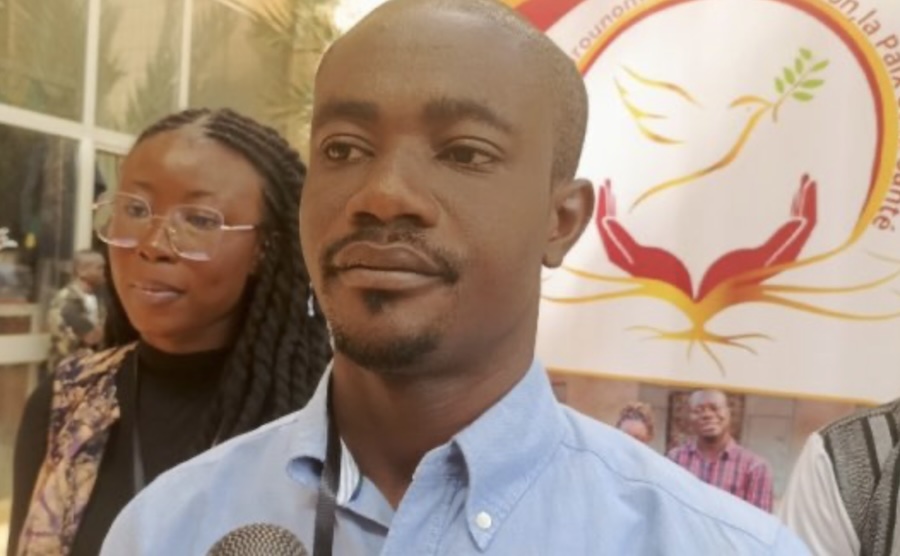. TOLERANCE & SOLIDARITY .
An article from Le Faso (translation by CPNN)
The Sougourounoma Initiative for Education, Peace and Health (ISEPS) is organizing the second edition of the International Youth Forum on the Culture of Peace from December 17 to 19, 2024. The meeting, under the theme “Youth, Religion, Mediation and Climate Change in the Sahel and West Africa”, brings together young people from Benin, Mali, Niger, Ivory Coast and Burkina Faso. It will allow participants to discuss issues related to peace, including the link between peace and climate change, conflict analysis and interreligious dialogue.

Serge Aimé Zabié from the NGO Indigo, Côte d’Ivoire
Faced with the security crisis currently facing Burkina Faso and other Sahel countries, the contribution of young people in the response to this crisis is more than necessary. This explains the holding of this international forum, which advocates the inclusion of young people and their initiatives in the peace process. During the meeting, young people will be equipped with conflict analysis, interreligious dialogue, as well as mediation of environmental conflicts. “The aim will be to mobilize young people to discuss the link between peace and climate change, to prevent violent extremism and ensure that conflicts related to climate change are not exploited by armed terrorist groups to recruit young people and carry out acts of violence,” said Dr. Sougourounoma Henri Kaboré, Chairman and Executive Director of ISEPS.
The 72 hours of work will be filled with sessions on strategic analysis of conflicts and the Sahelian and West African context and sessions on mediation of environmental conflicts, whether by civil society, religious and customary actors. The involvement of young people in adaptation to climate change and in peacebuilding will also be highlighted during this forum. “We hope that participants will acquire specific skills in conflict analysis, environmental mediation, and interreligious dialogue. We also hope that they will build relationships of friendship and partnership among themselves, beyond religious and cultural barriers, so that once they return to their communities they can engage more meaningfully in their communities to transform things,” says Dr. Sougourounoma Henri Kaboré.
(Click here for the original article in French.)
(continued in right column)
Youth initiatives for a culture of peace, How can we ensure they get the attention and funding they deserve?
(continued from left column)
The international youth forum is being held within the framework of the project “Youth in Interreligious Dialogue and Interreligious Mediation for Peaceful Communities in Burkina Faso”, which is being implemented in Fara in the Balé province. It is funded by the German Robert Bosche Foundation to the tune of 80,000 euros. Annie Höhne, representative of the German Ambassador, sponsor of the forum, welcomed the organization of the forum, and suggested that such initiatives are crucial to address current challenges.
“This support reflects our shared commitment to promoting peace and resilience in a region facing multidimensional challenges related to conflicts, humanitarian crises and climate change…In the current context of Burkina Faso, the role of young people is more crucial than ever. Their engagement in peaceful conflict resolution, environmental protection and interfaith dialogue is a cornerstone for building harmonious and sustainable communities,” she said.
During the forum, religious and customary leaders will speak with young people through presentations. Naaba Boalga, traditional chief of the village of Dawelgué, will lead a presentation focusing on traditional African religions in relation to nature. He will explore the relationships that existed between traditional African religions and the environment. “Our traditional societies are societies that practiced subsistence agriculture, that is to say that you mainly produced cereals and you consumed them. So you produce what you consume and you consume what you produce. And this mode of production, for example, means that traditional societies did not exert as much pressure on natural resources. Today, there are cash crops, such as sesame, cotton, which are practiced. Which is not a bad thing, but I am only placing myself in the traditional context to explain that at the time, there was a dialectical relationship with nature that did not pose any particular problem to this nature that managed to regenerate itself. We must now know how, in this context, we can at the same time benefit from cash crops and the advantages linked to the monetary economy, but while being respectful of nature,” he says.
For Alidou Ilboudo, coordinator of the Interreligious Council for Peace in Burkina, the emphasis on interreligious dialogue is a very important aspect of the forum. “We have a duty to connect and bring together young people of all faiths. Our mission is to tell them that indeed, each of us can have a faith, a belief, a dogma, but this dogma must nourish him with very strong convictions that remind him that we have a common origin that comes from God. And we are all brothers in humanity. So it is in dialogue that we learn this,” he maintains.
Having come from Côte d’Ivoire to take part in the forum, Serge Aimé Zabié of the NGO Indigo, which works in the field of social cohesion and peacekeeping, welcomes the initiative that includes young people in the search for peace. He hopes to come out of the meeting better equipped in peacebuilding. “My main expectation is that this forum can really change the mentality of young people so that they are no longer in a passive positionwhere they expect everything from the State, or think that peace comes from others. Peace must come from us young people, in our communities and families,” he said.
– – – – – –
If you wish to make a comment on this article, you may write to coordinator@cpnn-world.org with the title “Comment on United Nations Alliance of Civilizations” and we will put your comment on line. Because of the flood of spam, we have discontinued the direct application of comments.